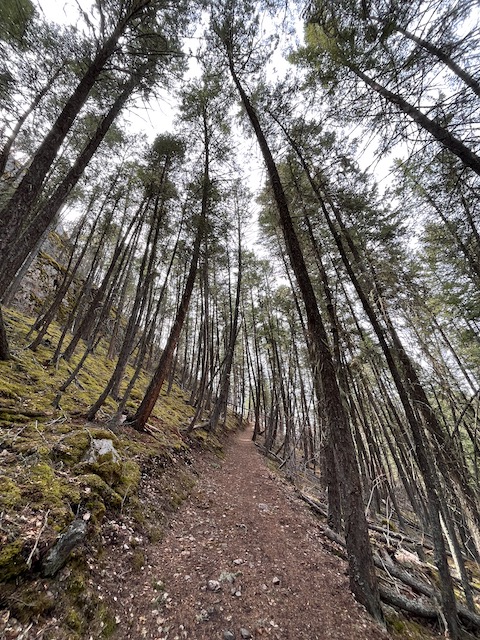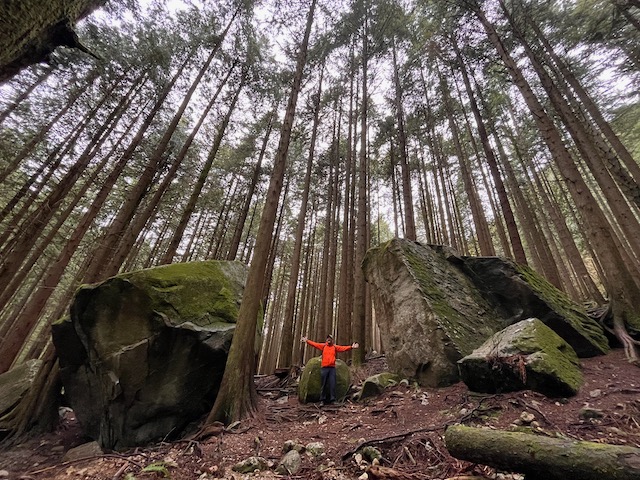It’s Easter Sunday and I should be driving to Vancouver to spend two days with family but instead I’m at home on antibiotics. Two weeks ago I had two bridges done, and one of them turned on me within a few days, requiring an emergency root canal. Dental pain is impressive in how rich and textured it feels, though of course that novelty gets tiring quickly.
I’m going to combine these link-sharing posts I’ve been doing lately with the weekly reviews I’ve been meaning to start doing. A weekly review appeals to my inner toxic productivity geek as an opportunity to close out tasks and make sure I’m planning for the week ahead. The link posts were meant as a way to structure how I look back at what I have written and read recently. Combining the two will hopefully help make the productivity review more focused on ideas and things that are actually important, and the link-sharing more about what I’m really doing.
(yes, this review will actually cover 2 weeks and be labelled #1, no I don’t really have a justification for this aside from it catches me up from the last post. I’m sure this will happen again)
I started The Argonauts by Maggie Nelson, and I suspect I’ll finish it tonight because it’s so personal and percussive I find it hard to put down. I just started God, Human, Animal, Machine by Meghan O’Gieblyn, and I’m enjoying it more than any recent book I’ve read on consciousness, nature, or AI. It’s very readable, which I mean as a compliment.
I am also reading A Primer for Poets, by Gregory Orr. Poetry is something I was introduced to in my mid-30s and is now something I read almsot every day. This book is an opportunity to try writing poetry more than I already do, and while I’m not sure I’ll ever share anything I write I’m enjoying the process.
“You, the reader, are invited to make use of anything that seems worthwhile and to discard the rest. But to do either—to assimilate or reject—is to become what Ralph Waldo Emerson calls “an active soul,” and that is essential if you wish to engage poetry.” Gregory Orr
Links and Quotes
“With every creature that vanishes, we lose a way of interpreting the world” – How Animals Perceive the World – articles – annotations
“Every animal is enclosed within its own sensory bubble, perceiving but a tiny sliver of an immense world. There is a wonderful word for this sensory bubble—Umwelt. It was defined and popularized by the Baltic German zoologist Jakob von Uexküll in 1909. Umwelt comes from the German word for “environment,” but Uexküll didn’t use it to refer to an animal’s surroundings. Instead, an Umwelt is specifically the part of those surroundings that an animal can sense and experience—its perceptual world. A tick, questing for mammalian blood, cares about body heat, the touch of hair, and the odor of butyric acid that emanates from skin. It doesn’t care about other stimuli, and probably doesn’t know that they exist. Every Umwelt is limited; it just doesn’t feel that way. Each one feels all-encompassing to those who experience it. Our Umwelt is all we know, and so we easily mistake it for all there is to know. This is an illusion that every creature shares.”
A review of Jenny Odell’s new book – Procrastination Is the True American Pastime
Saving Time is a rebuke to that restlessness. It is not merely a challenge to industrialized time; it is also—more so—a challenge to readers to resist the habits of cynicism that are so entwined with the tempos of our days. Our vernaculars of time tend to treat life’s moments as both saleable commodities and plodding inevitabilities; the contradiction leads to dissonance, yes, but also to nihilism. This is how procrastination, so often framed as an individual flaw, can become a collective failure. If time can be controlled, why worry about the future? And if it can’t be controlled, why bother to try? We carry time with us, on our wrists, on our screens, in our moral imaginations. But the ways we carry it can prevent us from feeling what this moment requires: urgency about the present, and agency over the future. Instead, too often, we feel very little at all. We allow ourselves to be lulled by the steady ticking of the clock.
The taste of AI – My New Job Is AI Sommelier and I Detect the Bouquet of Progress
“If I were an AI sommelier I would say that gpt-3.5-turbo is smooth and agreeable with a long finish, though perhaps lacking depth. text-davinci-003 is spicy and tight, sophisticated even.”
This prompted a lot of thinking about how to create opportunities for joy – The Broadest Portal to Joy
“My hunch is that joy is an ember for or precursor to wild and unpredictable and transgressive and unboundaried solidarity. And that that solidarity might incite further joy. Which might incite further solidarity. And on and on. My hunch is that joy, emerging from our common sorrow — which does not necessarily mean we have the same sorrows, but that we, in common, sorrow — might draw us together. It might depolarize us and de-atomize us enough that we can consider what, in common, we love. And though attending to what we hate in common is too often all the rage (and it happens also to be very big business), noticing what we love in common, and studying that, might help us survive. It’s why I think of joy, which gets us to love, as being a practice of survival. \”
Thinking about library technicians and how the status divide in libraries hurts both our colleagues and our work – Status in Academic Libraries
“If you think about current titles, staff positions mostly have “assistant” or “support” added to them. It just acts as a reminder that you don’t get to have that sense of ownership or authority, even if you have years of knowledge and expertise. It just felt like more of a way to signal how little power you have in those positions. While now, I have more freedom over my workday, people take me seriously (give or take a disciplinary faculty), and I get more confidence from that. But why couldn’t I have that before becoming a “librarian”?”
Opinion What if Climate Change Meant Not Doom — But Abundance?
“To respond to the climate crisis — a disaster on a more immense scale than anything our species has faced — we can and must summon what people facing disasters have: a sense of meaning, of deep connection and generosity, of being truly alive in the face of uncertainty. Of joy.”
Let’s not get trapped in the stories we are being sold right now – Resisting Deterministic Thinking – danah boyd
“what bothers me most about the deterministic framing that is hanging over all things AI right now is that it’s closing out opportunities for deeper situated thinking about the transformations that might unfold over the next few years.”
Stories about libraries and informatics that we have forgotten – Informatics of the Oppressed
“But alternatives are possible. In fact, from the very beginnings of informatics—the science of information—as an institutionalized field in the 1960s, anti-capitalists have tried to imagine less oppressive, perhaps even liberatory, ways of indexing and searching information. Two Latin American social movements in particular—Cuban socialism and liberation theology—inspired experiments with different approaches to informatics from the 1960s to the 1980s. Taken together, these two historical moments can help us imagine new ways to organize information that threaten the capitalist status quo—above all, by facilitating the wide circulation of the ideas of the oppressed.”
This possible future sounds wonderful and terrible and very plausible – Phase Change
“Language models as universal couplers begin to suggest protocols that really are plain language. What if the protocol of the GPT-alikes is just a bare TCP socket carrying free-form requests and instructions? What if the RSS feed of the future is simply my language model replying to yours when it asks, “What’s up with Robin lately?””
“I like this because I hate it; because it’s weird, and makes me feel uncomfortable.”
Mostly, I like the idea that being silly will once again be an advantage. We talk a lot about how manual labor and emotional intelligence are for the moment safe from AI disruption, but what about silliness? Will being silly protect us? I sure hope so – What Is the Single Best Way of Improving Your GPT Prompts?
“Imagine if humanity ends up divided into two classes of people: those who are willing/not embarrassed to tack on extra “silly bits” to their prompts, and those who are not so willing. The differences in capabilities will end up being remarkable. Are perhaps many elites and academics unwilling to go the extra mile in their prompts? Do they feel a single sentence question ought to be enough? Are they in any case constitutionally unused to providing extra context for their requests?”
If We Don’t Master A.I., It Will Master Us
“For thousands of years we humans have lived inside the dreams of other humans. We have worshiped gods, pursued ideals of beauty, and dedicated our lives to causes that originated in the imagination of some prophet, poet or politician. Soon we will also find ourselves living inside the hallucinations of non-human intelligence.”
This whole interview is great – Nick Cave on the Fragility of Life
“There’s no earthly reason why we need to invent a technology that can mimic this most beautiful and mysterious creative act. Particularly writing a song. The thing about writing a good song is that it tells you something about yourself you didn’t already know. That’s the thing. You can’t mimic that. The good song is always rushing forward. It annihilates, to some degree, the songs that you’d previously written, because you are moving forward all the time. That’s what the creative impulse is—it’s both creative and destructive and is always one step ahead of you. These impulses can’t be replicated by a machine. Maybe A.I. can make a song that’s indistinguishable from what I can do. Maybe even a better song. But, to me, that doesn’t matter—that’s not what art is. Art has to do with our limitations, our frailties, and our faults as human beings. It’s the distance we can travel away from our own frailties. That’s what is so awesome about art: that we deeply flawed creatures can sometimes do extraordinary things. A.I. just doesn’t have any of that stuff going on.”


